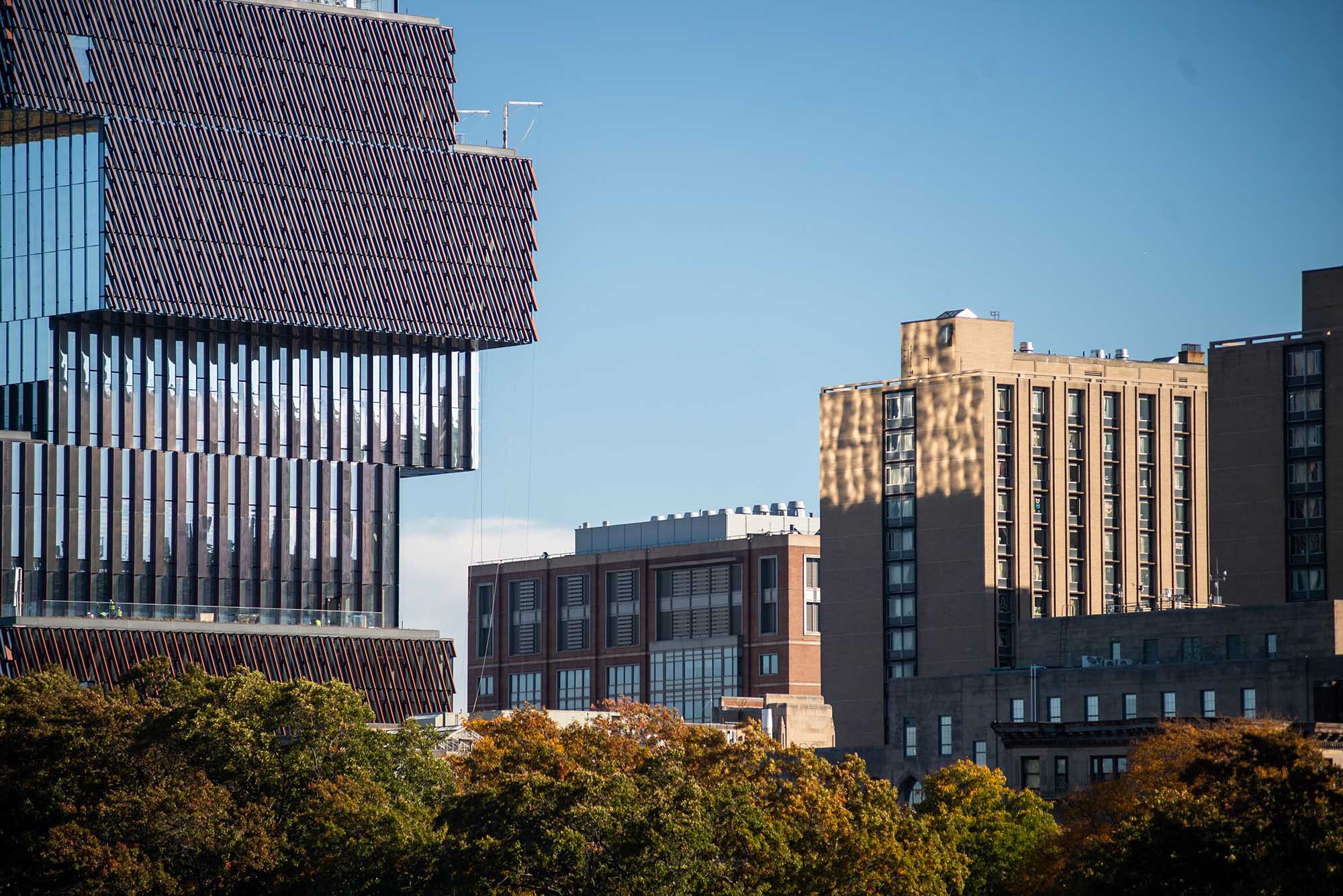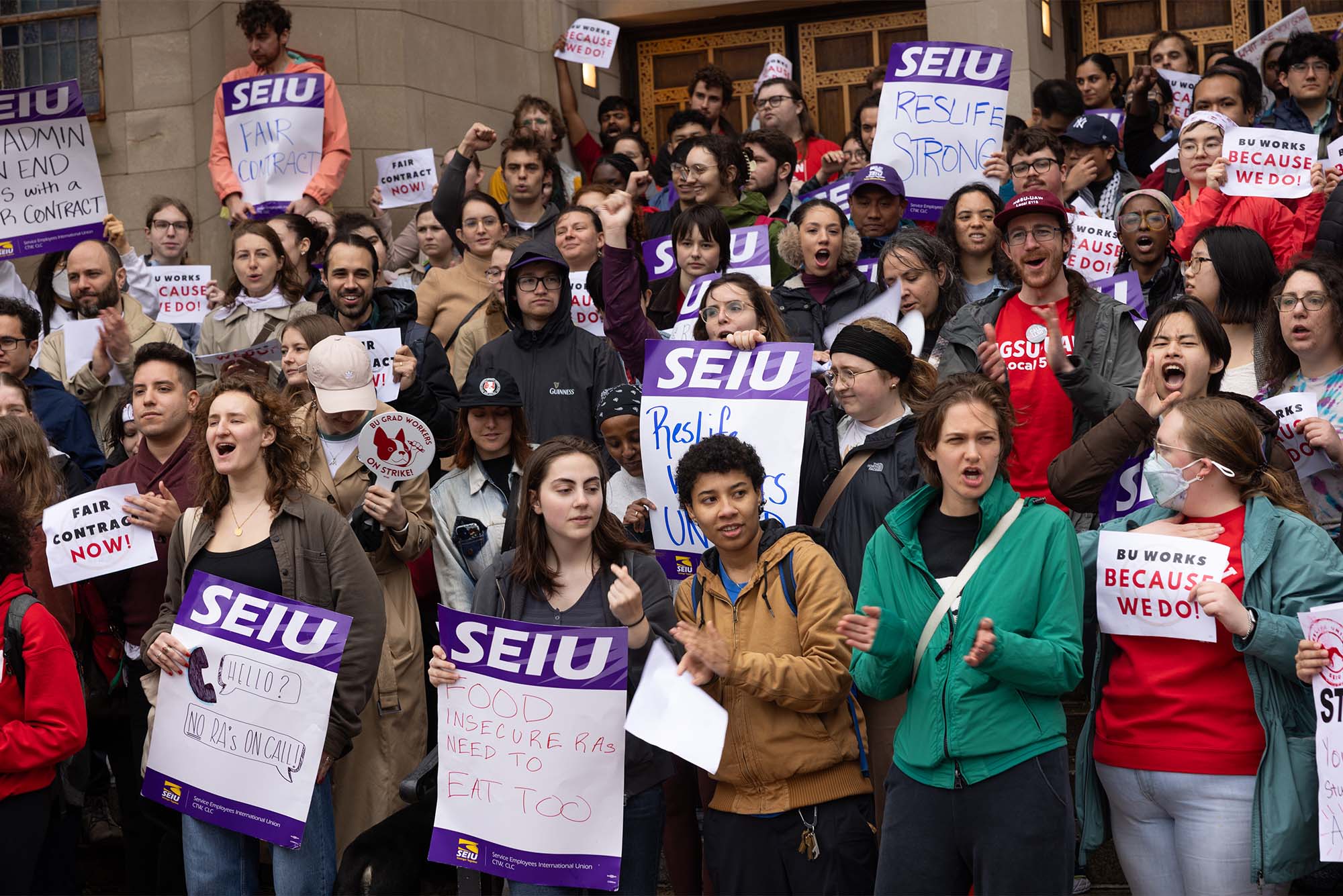BU RAs Authorize Four-Day Strike over Contract Negotiations
ResLife offices will remain open during regular business hours, and its professional staff will respond to calls for assistance during the evening, weekend, and overnight hours

Members of Boston University’s Residence Life Union will go on strike over the weekend, after negotiations with BU officials failed to result in a new contract. Photo by Cydney Scott
BU RAs Authorize Four-Day Strike over Contract Negotiations
ResLife offices will remain open during regular business hours, and its professional staff will respond to calls for assistance during the evening, weekend, and overnight hours
Members of Boston University’s Residence Life Union, a collection of nearly 300 resident assistants (RAs), graduate resident assistants (GRAs), and graduate hall assistants (GHAs), authorized a strike on Thursday after negotiations with BU officials failed to result in a new contract.
Union members, who are part of the Service Employees International Union (SEIU) 509, plan to walk off the job on Friday, April 12, for a four-day strike that will kick off with a rally at noon on Marsh Plaza. A series of actions, including pickets during campus information sessions and tours, are scheduled through the holiday weekend.
Responding to word of the strike, the University says it has in place a set of contingency plans to ensure the safety and support of all students in residence halls during the strike.
In a message sent on Thursday to all RAs, GRAs, and GHAs, BU Dean of Students Jason Campbell-Foster wrote, “Voting to strike, while a serious decision at any point during contract negotiations, is a fundamental right afforded to you. I am certain that you did not come to this conclusion without deep consideration for the impact it will have on the experiences of the residents you have been caring for. There is more work to be done at the bargaining table, and while I believe declaring a strike is unnecessary, given our progress on key issues, we respect your right to do so.”
In a separate message to all students living in BU residences, Campbell-Foster reiterated that striking is “a fundamental right afforded to all employees,” adding, “We respect their choice to cease duties as we negotiate their first labor contract since unionizing in 2023. Equally as important as respecting their right to strike is our commitment to ensuring that you continue to have access to support and services in a safe environment.”
The ResLife strike comes at the same time as another strike unfolding on BU’s campus. Members of the Graduate Workers Union (BUGWU), also part of SEIU 509, have been on strike since March 25. They’re also pressing for a new contract, with increased stipends and better benefits, among other issues.
According to a publicly available bargaining tracker organized by the ResLife union, the two sides have yet to reach an agreement on issues that include public health accommodations, additional mental health and addiction training, workload, compensation, and benefits.

A new Frequently Asked Questions page has been added to the BU ResLife website, with information about the contract negotiations, the strike, and the ResLife union more broadly. According to that site, union representatives have met with BU’s bargaining unit seven times to negotiate (most recently on Thursday, April 11) since the union put forth new contract language in December.
ResLife student workers who choose to forgo work during the strike will have to turn in office keys and master keys to the professional staff responsible for their building or neighborhood. However, the University says it will not restrict the workers from accessing their rooms or dining plans, nor will officials charge a daily rate for room and board during the strike.
The RAs, GRAs, and GHAs at BU are sophomores, juniors, seniors, and graduate students chosen for their leadership and community-building abilities. They are responsible for addressing residence hall rules and building community among students in the dorms. They’re often the first University workers to deal with student conflicts, roommate issues, and crises that surface in BU housing. In return, they receive free housing (worth approximately $11,000 to $20,000), and some also receive free or discounted meal plans, an additional value of several thousand dollars.
Among other stipulations, ResLife union members are seeking additional financial compensation, a key sticking point in the negotiations.
“Housing as compensation does not acknowledge the critical role we fulfill around the clock at the university,” said second-year RA Jasmine A. Richardson (CGS’23, Pardee’25) in a press release provided by the union. “Between unpaid training time and managing the high RA-to-student ratios, many of us are struggling to find financial and academic stability. BU has the resources to invest in us as workers, and settling a fair contract would bring us closer to a more equitable campus for all.”
According to BU’s FAQ page, the University has responded with offers that include (but aren’t limited to):
- Free housing during the period of employment
- Meal plans for all RAs (currently meals are only provided to RAs in dormitory-style accommodations)
- A $1,000 stipend per semester for all RAs, with an additional $500 per semester for GRAs with supervisory responsibilities
- Air conditioning units installed in certain RA rooms during the summer months
- A new grievance and third-party arbitration provision to provide a formal process for employees to resolve workplace issues
- Access to optional training for NARCAN and CPR administration, free of charge to all members of the bargaining unit
- Availability of KN95 masks in Residence Life offices for student workers
Collectively, Residence Life workers oversee 11,000 students living in 150 residences and are one of the few departments at the University with an on-call system that allows staff to be available to assist students, parents, and members of the University community 24 hours a day, 7 days a week, and 365 days a year.
“Our work involves supporting students through navigating difficult situations, which can range from conflict mediation to crisis intervention,” said GRA Kira Levenson (SPH’24) in the union’s press release. “We need training that more accurately reflects our duties so that we can foster a safer environment on campus for everyone.”
About 75 percent of undergraduate students live on campus during all four years of their college career, according to BU Admissions figures. The University operates on-campus residences for both undergraduate and graduate students that span from large traditional dormitories such as Warren Towers to smaller apartment-style brownstones.
During the strike, professional Residence Life staff will field calls during the evening, weekend, and overnight hours. The strike does not affect services offered by the security assistants or the Boston University Police Department. All emergencies should continue to be directed to 617-353-2121. Facilities-related issues can be directed to 617-353-2105.
Melina Nguyen (COM’24) and Emily Wyrwa (COM’26) contributed to this report.

Comments & Discussion
Boston University moderates comments to facilitate an informed, substantive, civil conversation. Abusive, profane, self-promotional, misleading, incoherent or off-topic comments will be rejected. Moderators are staffed during regular business hours (EST) and can only accept comments written in English. Statistics or facts must include a citation or a link to the citation.